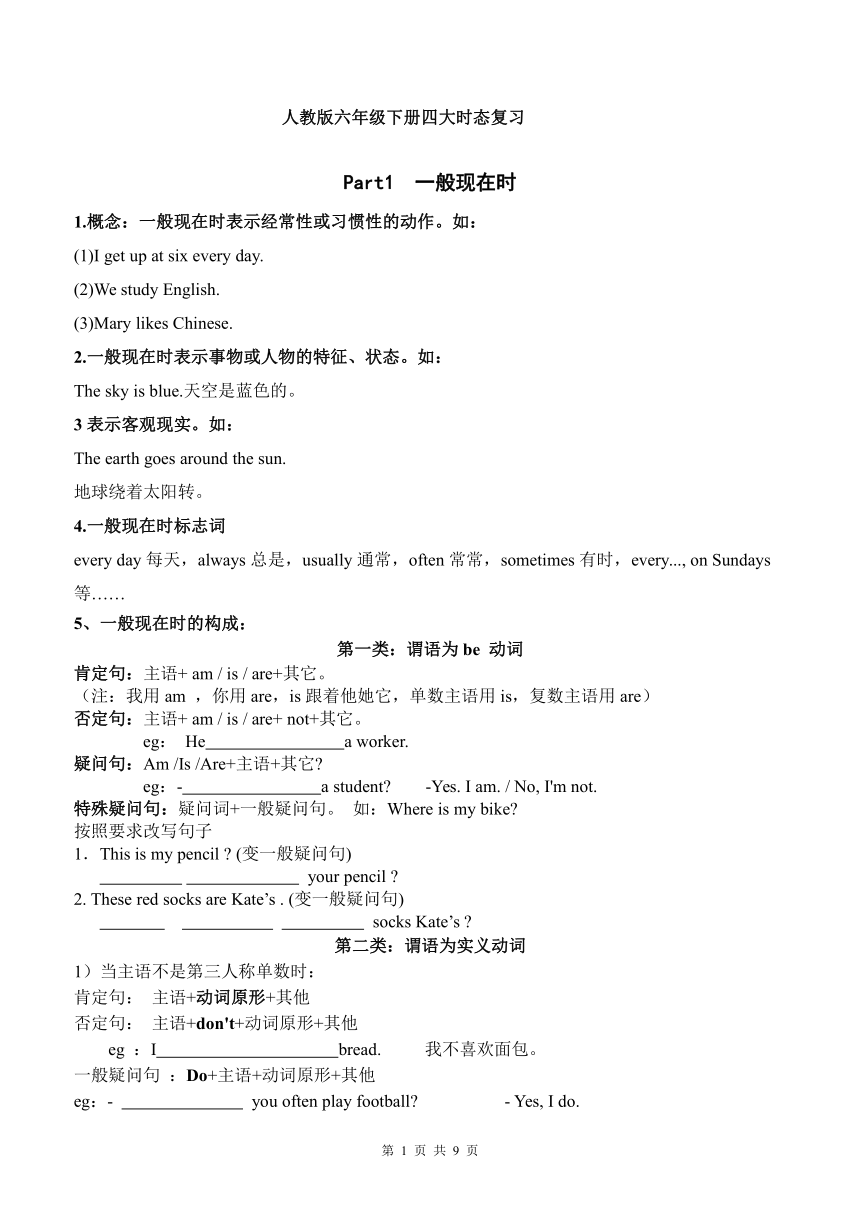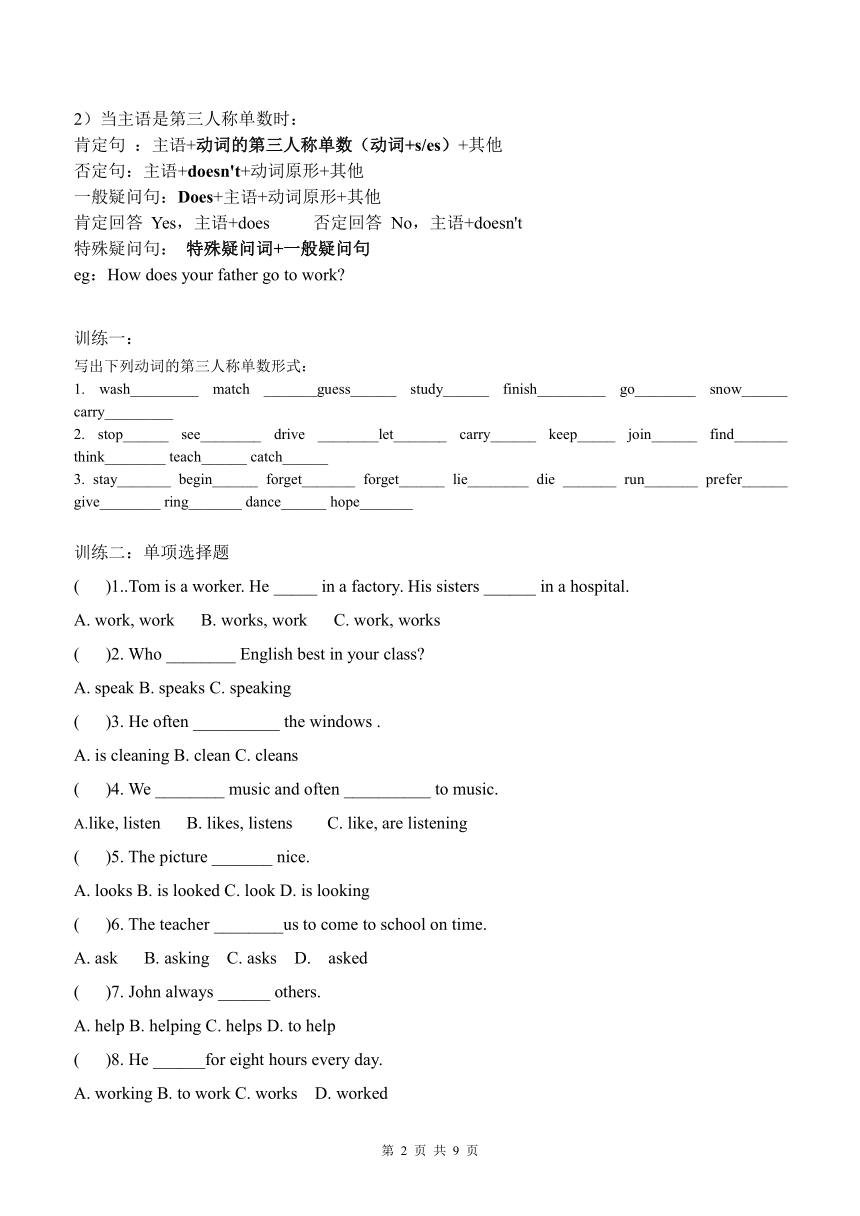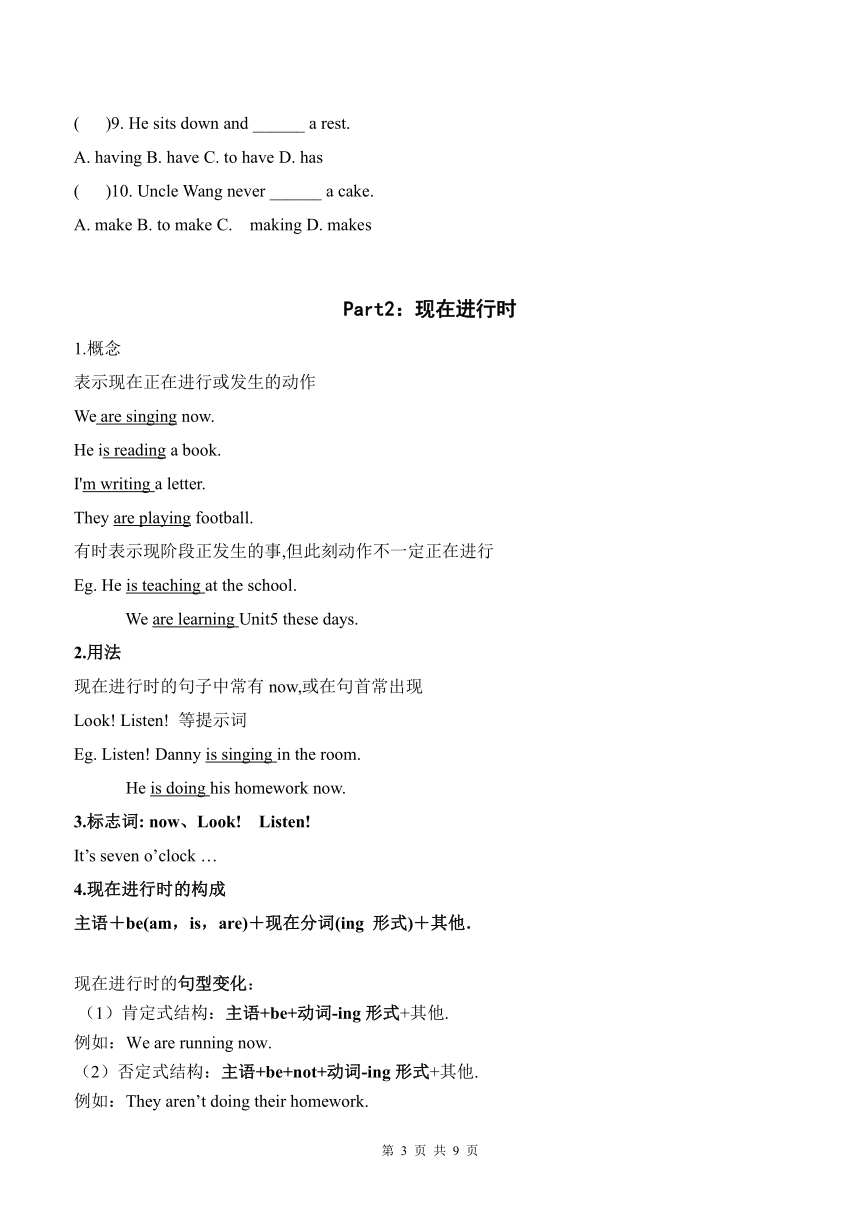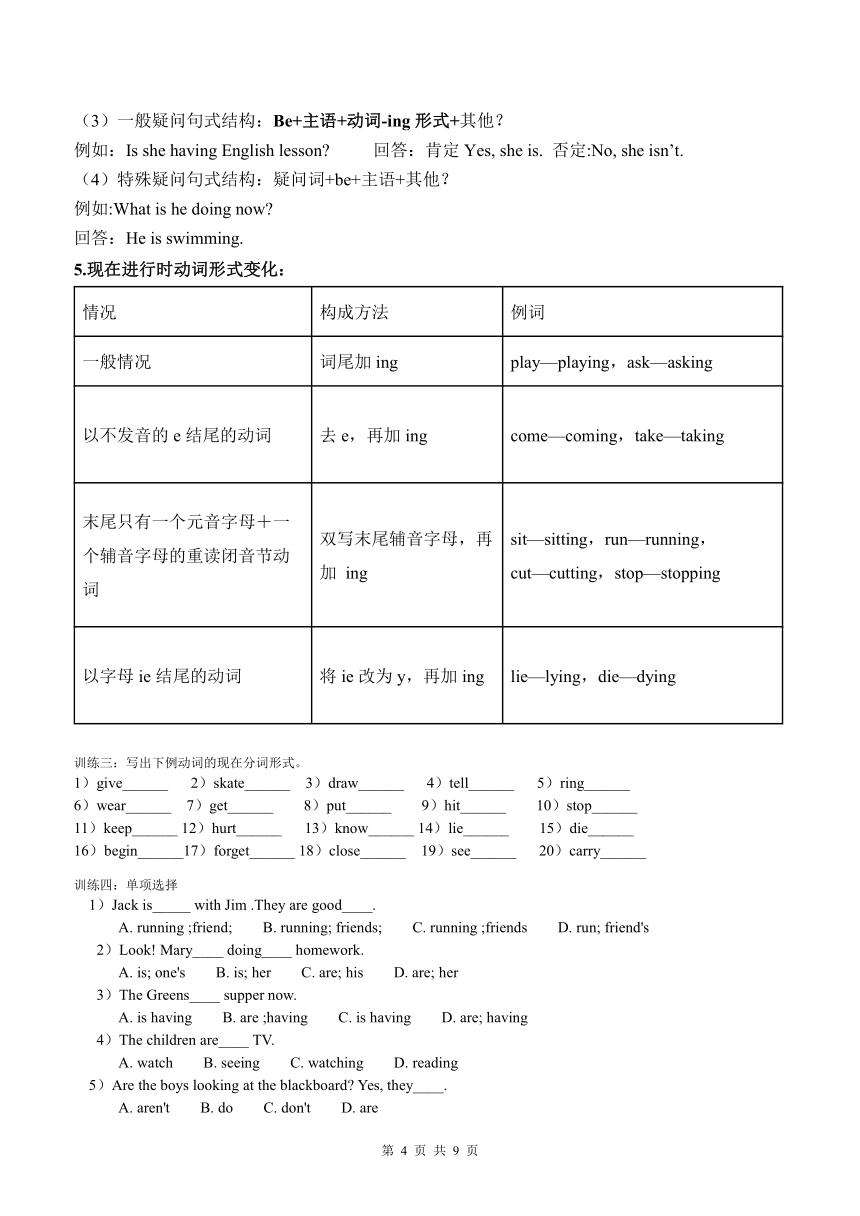人教版(PEP)小学英语六年级下册期末复习四大时态复习(含答案)
文档属性
| 名称 | 人教版(PEP)小学英语六年级下册期末复习四大时态复习(含答案) |  | |
| 格式 | docx | ||
| 文件大小 | 58.0KB | ||
| 资源类型 | 试卷 | ||
| 版本资源 | 人教版(PEP) | ||
| 科目 | 英语 | ||
| 更新时间 | 2025-04-21 07:07:47 | ||
图片预览




文档简介
人教版六年级下册四大时态复习
Part1 一般现在时
1.概念:一般现在时表示经常性或习惯性的动作。如:
(1)I get up at six every day.
(2)We study English.
(3)Mary likes Chinese.
2.一般现在时表示事物或人物的特征、状态。如:
The sky is blue.天空是蓝色的。
3表示客观现实。如:
The earth goes around the sun.
地球绕着太阳转。
4.一般现在时标志词
every day每天,always总是,usually通常,often常常,sometimes有时,every..., on Sundays等……
5、一般现在时的构成:
第一类:谓语为be 动词
肯定句:主语+ am / is / are+其它。
(注:我用am ,你用are,is跟着他她它,单数主语用is,复数主语用are)
否定句:主语+ am / is / are+ not+其它。
eg: He a worker.
疑问句:Am /Is /Are+主语+其它
eg:- a student -Yes. I am. / No, I'm not.
特殊疑问句:疑问词+一般疑问句。 如:Where is my bike
按照要求改写句子
1.This is my pencil (变一般疑问句)
your pencil
2. These red socks are Kate’s . (变一般疑问句)
socks Kate’s
第二类:谓语为实义动词
1)当主语不是第三人称单数时:
肯定句: 主语+动词原形+其他
否定句: 主语+don't+动词原形+其他
eg :I bread. 我不喜欢面包。
一般疑问句 :Do+主语+动词原形+其他
eg:- you often play football - Yes, I do.
2)当主语是第三人称单数时:
肯定句 :主语+动词的第三人称单数(动词+s/es)+其他
否定句:主语+doesn't+动词原形+其他
一般疑问句:Does+主语+动词原形+其他
肯定回答 Yes,主语+does 否定回答 No,主语+doesn't
特殊疑问句: 特殊疑问词+一般疑问句
eg:How does your father go to work
训练一:
写出下列动词的第三人称单数形式:
1. wash_________ match _______guess______ study______ finish_________ go________ snow______ carry_________
2. stop______ see________ drive ________let_______ carry______ keep_____ join______ find_______ think________ teach______ catch______
3. stay_______ begin______ forget_______ forget______ lie________ die _______ run_______ prefer______ give________ ring_______ dance______ hope_______
训练二:单项选择题
( )1..Tom is a worker. He _____ in a factory. His sisters ______ in a hospital.
A. work, work B. works, work C. work, works
( )2. Who ________ English best in your class
A. speak B. speaks C. speaking
( )3. He often __________ the windows .
A. is cleaning B. clean C. cleans
( )4. We ________ music and often __________ to music.
A.like, listen B. likes, listens C. like, are listening
( )5. The picture _______ nice.
A. looks B. is looked C. look D. is looking
( )6. The teacher ________us to come to school on time.
A. ask B. asking C. asks D. asked
( )7. John always ______ others.
A. help B. helping C. helps D. to help
( )8. He ______for eight hours every day.
A. working B. to work C. works D. worked
( )9. He sits down and ______ a rest.
A. having B. have C. to have D. has
( )10. Uncle Wang never ______ a cake.
A. make B. to make C. making D. makes
Part2:现在进行时
1.概念
表示现在正在进行或发生的动作
We are singing now.
He is reading a book.
I'm writing a letter.
They are playing football.
有时表示现阶段正发生的事,但此刻动作不一定正在进行
Eg. He is teaching at the school.
We are learning Unit5 these days.
2.用法
现在进行时的句子中常有now,或在句首常出现
Look! Listen! 等提示词
Eg. Listen! Danny is singing in the room.
He is doing his homework now.
3.标志词: now、Look! Listen!
It’s seven o’clock …
4.现在进行时的构成
主语+be(am,is,are)+现在分词(ing 形式)+其他.
现在进行时的句型变化:
(1)肯定式结构:主语+be+动词-ing形式+其他.
例如:We are running now.
(2)否定式结构:主语+be+not+动词-ing形式+其他.
例如:They aren’t doing their homework.
(3)一般疑问句式结构:Be+主语+动词-ing形式+其他?
例如:Is she having English lesson 回答:肯定Yes, she is. 否定:No, she isn’t.
(4)特殊疑问句式结构:疑问词+be+主语+其他?
例如:What is he doing now
回答:He is swimming.
5.现在进行时动词形式变化:
情况 构成方法 例词
一般情况 词尾加ing play—playing,ask—asking
以不发音的e结尾的动词 去e,再加ing come—coming,take—taking
末尾只有一个元音字母+一个辅音字母的重读闭音节动词 双写末尾辅音字母,再加 ing sit—sitting,run—running, cut—cutting,stop—stopping
以字母ie结尾的动词 将ie改为y,再加ing lie—lying,die—dying
训练三:写出下例动词的现在分词形式。
1)give______ 2)skate______ 3)draw______ 4)tell______ 5)ring______
6)wear______ 7)get______ 8)put______ 9)hit______ 10)stop______
11)keep______ 12)hurt______ 13)know______ 14)lie______ 15)die______
16)begin______17)forget______ 18)close______ 19)see______ 20)carry______
训练四:单项选择
1)Jack is_____ with Jim .They are good____.
A. running ;friend; B. running; friends; C. running ;friends D. run; friend's
2)Look! Mary____ doing____ homework.
A. is; one's B. is; her C. are; his D. are; her
3)The Greens____ supper now.
A. is having B. are ;having C. is having D. are; having
4)The children are____ TV.
A. watch B. seeing C. watching D. reading
5)Are the boys looking at the blackboard Yes, they____.
A. aren't B. do C. don't D. are
Part3:一般将来时
1.一般将来时的概念
一般将来时表示将要发生的动作或存在的状态
We are going to play football this weekend
I will get something to eat.
She's going to go to bed at nine.
I'm going to have a picnic this afternoon.
2.一般将来时的构成
(1)主语+be(am,is,are)going to+动词原形+其他.
(2)主语+will+动词原形+其他.
3.标志词
tomorrow,next day/week month/year,soon,the day after tomorrow
in a few days, the day after tomorrow, this evening ……等
训练五:
( ) 1.What __ __you ___ _tomorrow
A. are, doing B. are, going to do C. do, do
( ) 2.I’m going to the zoo __ __ this afternoon
A. in B. on C. /
( ) 3. Are you going to ___ _ your friend
A. visit B. visiting C. is visit
( ) 4. There __________ a meeting tomorrow afternoon.
A. will be going to B. will going to be C. is going to be D. will go to be
( ) 5. Charlie ________ here next month.
A. isn't working B. doesn't working
C.isn't going to working D. won't work
( ) 6. He ________ very busy this week, he ________ free next week.
A. will be; is B. is; is C. will be; will be D. is; will be
( ) 7. There ________ a dolphin show in the zoo tomorrow evening.
A. was B. is going to have C. will have D. is going to be
( ) 8. -_____ you ______ free tomorrow - No. I _____ free the day after tomorrow.
A. Are; going to; will B. Are; going to be; will
C. Are; going to; will be D. Are; going to be; will be
( ) 9. Mother ________ me a nice present on my next birthday.
A. will gives B. will give C. gives D. give
( ) 10. He ________ her a beautiful hat on her next birthday.
A. gives B. gave C. will give D. is going to giving
Part4:一般过去时
1.概念
一般过去式表示过去某个时间里发生的动作或状态。
I read a book yesterday.
He bought a bag last week.
We went to school last year.
2.一般过去时的构成
be动词的一般过去时:
主语+be过去式形式+其他. I was a student ten years ago.
实义动词的一般过去时:
主语+动词过去式形式+其他.
I ate some cakes last Saturday.
3.时间标志词:
last weekend ,last night, last Monday, yesterday
the day before yesterday等
4.动词过去式的四大规则变化
①一般情况,直接加上-ed。如:look-looked。
②以不发音的字母e结尾的动词,加-d。如:live-lived。
③以重读闭音节结尾,先双写辅音字母,再加-ed。如:stop-stopped
④辅音字母+y结尾的动词,先变y为i,再加-ed。如:study-studied。
动词过去式的不规则变化
训练六:写出下列单词的过去式
am , is-________ are--________ do-________
see-________ say-_________ give-________
get-________ go-_________ come-__________
have-_________ eat-_________ take-________
训练七:单项选择
1. ---_______you watch TV last night ---Yes, I did.
A. Did B. Do C. Does
2. I______ last weekend.
A. went swimming B. go swimming C. go for a swim
3. --- Did he __________ on the holiday --- Yes, he did.
A. saw elephants B. sees elephants C. see elephants
4.I can sing this song because my father______me to sing it at my last birthday party
A. taught B. will teach C. teaches
课后作业:
1. _________Alice often play the piano. No, she __________.
A. Do; do B. Does; does C. Does; doesn’t
2. Every one _________ to their teacher in the classroom.
A. are listening B. is listening C. listen
3. Danny _______ breakfast five times last week.
A. ate B. eat C. eated
4. I’m going to ________ some chopsticks ________ Sunday afternoon.
A. bought; on B. buy; on C. buy; in
5. Are you going to take a piano class ________
A. No, we not B. No, I am C. Yes, I am
6. Is he _________ TV?Yes, he is.
A. watch B. watching C. not
7. The kite _______ a bird.
A. look like B. is looking C. looks like
8. What did you do on your holiday I ________
A. bought a present B. go skiing C. learn English
9. Sandy often ________ his homework on Sundays .
A. do B. does C. did
10. He _______ a race with Ming Ming.
A. to have B.had C. going to have
11. What do you usually do on your holiday _________
A. Sing and dance B. Saw elephants C.Took picture
12. It’s 10 o’clock. Ben ________ TV in the bedroom.
A. is watching B. watch C. watches
13. Did you eat good food in China __________.
A. Yes, I do B. No, I didn’t C. No, I did
14. I ________ free this afternoon.
A. be B. will be C. going to be
15. I can’t find my pen. Let me _______.
A. go and ask her B. go and ask hers C. go and ask she
16. Fangfang is a good student. She _______maths.
A. does good at B. well do it C. is good at
17. Are you washing clothes?
A. Yes, you are B. Yes, I am C. No, I am
18. What did he ________ yesterday He ________ his homework.
A. did; did B. do; did C. do; do
19. _________ they taking pictures. Yes, they are.
A. Am B. Be C. Are
20. They will ________ roast ducks in Beijing.
A. ate B. eats C. eat
答案:
训练一:
1. washes matches guesses studies finishes goes snows carries
2. stops sees drives lets carries keeps joins finds thinks teaches catches
3. stays begins forgets lies runs gives rings dances hopes
训练二:
1--10 B B C A A C C C D D
训练三:
1.giving;2.skating;3.drawing;4.telling;5.ringing;6.wearing;7.getting;8.putting;9.hitting;10.stopping;11.keeping;12.hurting;13.knowing;14.lying;15.dying;16.beginning;17.forgetting; 18.closing;19.seeing;20.carrying。
训练四:
1-5 BBDCD
训练五:
1--5 B C A C D 6--10 D D D B C
训练六:
was were did
saw said gave
got went came
had ate took
训练七:
1--4 A A C A
课后作业:
1--5 C B A B C 6--10 B C A B B 11-15 A A B B A 16--20 C B B C C
Part1 一般现在时
1.概念:一般现在时表示经常性或习惯性的动作。如:
(1)I get up at six every day.
(2)We study English.
(3)Mary likes Chinese.
2.一般现在时表示事物或人物的特征、状态。如:
The sky is blue.天空是蓝色的。
3表示客观现实。如:
The earth goes around the sun.
地球绕着太阳转。
4.一般现在时标志词
every day每天,always总是,usually通常,often常常,sometimes有时,every..., on Sundays等……
5、一般现在时的构成:
第一类:谓语为be 动词
肯定句:主语+ am / is / are+其它。
(注:我用am ,你用are,is跟着他她它,单数主语用is,复数主语用are)
否定句:主语+ am / is / are+ not+其它。
eg: He a worker.
疑问句:Am /Is /Are+主语+其它
eg:- a student -Yes. I am. / No, I'm not.
特殊疑问句:疑问词+一般疑问句。 如:Where is my bike
按照要求改写句子
1.This is my pencil (变一般疑问句)
your pencil
2. These red socks are Kate’s . (变一般疑问句)
socks Kate’s
第二类:谓语为实义动词
1)当主语不是第三人称单数时:
肯定句: 主语+动词原形+其他
否定句: 主语+don't+动词原形+其他
eg :I bread. 我不喜欢面包。
一般疑问句 :Do+主语+动词原形+其他
eg:- you often play football - Yes, I do.
2)当主语是第三人称单数时:
肯定句 :主语+动词的第三人称单数(动词+s/es)+其他
否定句:主语+doesn't+动词原形+其他
一般疑问句:Does+主语+动词原形+其他
肯定回答 Yes,主语+does 否定回答 No,主语+doesn't
特殊疑问句: 特殊疑问词+一般疑问句
eg:How does your father go to work
训练一:
写出下列动词的第三人称单数形式:
1. wash_________ match _______guess______ study______ finish_________ go________ snow______ carry_________
2. stop______ see________ drive ________let_______ carry______ keep_____ join______ find_______ think________ teach______ catch______
3. stay_______ begin______ forget_______ forget______ lie________ die _______ run_______ prefer______ give________ ring_______ dance______ hope_______
训练二:单项选择题
( )1..Tom is a worker. He _____ in a factory. His sisters ______ in a hospital.
A. work, work B. works, work C. work, works
( )2. Who ________ English best in your class
A. speak B. speaks C. speaking
( )3. He often __________ the windows .
A. is cleaning B. clean C. cleans
( )4. We ________ music and often __________ to music.
A.like, listen B. likes, listens C. like, are listening
( )5. The picture _______ nice.
A. looks B. is looked C. look D. is looking
( )6. The teacher ________us to come to school on time.
A. ask B. asking C. asks D. asked
( )7. John always ______ others.
A. help B. helping C. helps D. to help
( )8. He ______for eight hours every day.
A. working B. to work C. works D. worked
( )9. He sits down and ______ a rest.
A. having B. have C. to have D. has
( )10. Uncle Wang never ______ a cake.
A. make B. to make C. making D. makes
Part2:现在进行时
1.概念
表示现在正在进行或发生的动作
We are singing now.
He is reading a book.
I'm writing a letter.
They are playing football.
有时表示现阶段正发生的事,但此刻动作不一定正在进行
Eg. He is teaching at the school.
We are learning Unit5 these days.
2.用法
现在进行时的句子中常有now,或在句首常出现
Look! Listen! 等提示词
Eg. Listen! Danny is singing in the room.
He is doing his homework now.
3.标志词: now、Look! Listen!
It’s seven o’clock …
4.现在进行时的构成
主语+be(am,is,are)+现在分词(ing 形式)+其他.
现在进行时的句型变化:
(1)肯定式结构:主语+be+动词-ing形式+其他.
例如:We are running now.
(2)否定式结构:主语+be+not+动词-ing形式+其他.
例如:They aren’t doing their homework.
(3)一般疑问句式结构:Be+主语+动词-ing形式+其他?
例如:Is she having English lesson 回答:肯定Yes, she is. 否定:No, she isn’t.
(4)特殊疑问句式结构:疑问词+be+主语+其他?
例如:What is he doing now
回答:He is swimming.
5.现在进行时动词形式变化:
情况 构成方法 例词
一般情况 词尾加ing play—playing,ask—asking
以不发音的e结尾的动词 去e,再加ing come—coming,take—taking
末尾只有一个元音字母+一个辅音字母的重读闭音节动词 双写末尾辅音字母,再加 ing sit—sitting,run—running, cut—cutting,stop—stopping
以字母ie结尾的动词 将ie改为y,再加ing lie—lying,die—dying
训练三:写出下例动词的现在分词形式。
1)give______ 2)skate______ 3)draw______ 4)tell______ 5)ring______
6)wear______ 7)get______ 8)put______ 9)hit______ 10)stop______
11)keep______ 12)hurt______ 13)know______ 14)lie______ 15)die______
16)begin______17)forget______ 18)close______ 19)see______ 20)carry______
训练四:单项选择
1)Jack is_____ with Jim .They are good____.
A. running ;friend; B. running; friends; C. running ;friends D. run; friend's
2)Look! Mary____ doing____ homework.
A. is; one's B. is; her C. are; his D. are; her
3)The Greens____ supper now.
A. is having B. are ;having C. is having D. are; having
4)The children are____ TV.
A. watch B. seeing C. watching D. reading
5)Are the boys looking at the blackboard Yes, they____.
A. aren't B. do C. don't D. are
Part3:一般将来时
1.一般将来时的概念
一般将来时表示将要发生的动作或存在的状态
We are going to play football this weekend
I will get something to eat.
She's going to go to bed at nine.
I'm going to have a picnic this afternoon.
2.一般将来时的构成
(1)主语+be(am,is,are)going to+动词原形+其他.
(2)主语+will+动词原形+其他.
3.标志词
tomorrow,next day/week month/year,soon,the day after tomorrow
in a few days, the day after tomorrow, this evening ……等
训练五:
( ) 1.What __ __you ___ _tomorrow
A. are, doing B. are, going to do C. do, do
( ) 2.I’m going to the zoo __ __ this afternoon
A. in B. on C. /
( ) 3. Are you going to ___ _ your friend
A. visit B. visiting C. is visit
( ) 4. There __________ a meeting tomorrow afternoon.
A. will be going to B. will going to be C. is going to be D. will go to be
( ) 5. Charlie ________ here next month.
A. isn't working B. doesn't working
C.isn't going to working D. won't work
( ) 6. He ________ very busy this week, he ________ free next week.
A. will be; is B. is; is C. will be; will be D. is; will be
( ) 7. There ________ a dolphin show in the zoo tomorrow evening.
A. was B. is going to have C. will have D. is going to be
( ) 8. -_____ you ______ free tomorrow - No. I _____ free the day after tomorrow.
A. Are; going to; will B. Are; going to be; will
C. Are; going to; will be D. Are; going to be; will be
( ) 9. Mother ________ me a nice present on my next birthday.
A. will gives B. will give C. gives D. give
( ) 10. He ________ her a beautiful hat on her next birthday.
A. gives B. gave C. will give D. is going to giving
Part4:一般过去时
1.概念
一般过去式表示过去某个时间里发生的动作或状态。
I read a book yesterday.
He bought a bag last week.
We went to school last year.
2.一般过去时的构成
be动词的一般过去时:
主语+be过去式形式+其他. I was a student ten years ago.
实义动词的一般过去时:
主语+动词过去式形式+其他.
I ate some cakes last Saturday.
3.时间标志词:
last weekend ,last night, last Monday, yesterday
the day before yesterday等
4.动词过去式的四大规则变化
①一般情况,直接加上-ed。如:look-looked。
②以不发音的字母e结尾的动词,加-d。如:live-lived。
③以重读闭音节结尾,先双写辅音字母,再加-ed。如:stop-stopped
④辅音字母+y结尾的动词,先变y为i,再加-ed。如:study-studied。
动词过去式的不规则变化
训练六:写出下列单词的过去式
am , is-________ are--________ do-________
see-________ say-_________ give-________
get-________ go-_________ come-__________
have-_________ eat-_________ take-________
训练七:单项选择
1. ---_______you watch TV last night ---Yes, I did.
A. Did B. Do C. Does
2. I______ last weekend.
A. went swimming B. go swimming C. go for a swim
3. --- Did he __________ on the holiday --- Yes, he did.
A. saw elephants B. sees elephants C. see elephants
4.I can sing this song because my father______me to sing it at my last birthday party
A. taught B. will teach C. teaches
课后作业:
1. _________Alice often play the piano. No, she __________.
A. Do; do B. Does; does C. Does; doesn’t
2. Every one _________ to their teacher in the classroom.
A. are listening B. is listening C. listen
3. Danny _______ breakfast five times last week.
A. ate B. eat C. eated
4. I’m going to ________ some chopsticks ________ Sunday afternoon.
A. bought; on B. buy; on C. buy; in
5. Are you going to take a piano class ________
A. No, we not B. No, I am C. Yes, I am
6. Is he _________ TV?Yes, he is.
A. watch B. watching C. not
7. The kite _______ a bird.
A. look like B. is looking C. looks like
8. What did you do on your holiday I ________
A. bought a present B. go skiing C. learn English
9. Sandy often ________ his homework on Sundays .
A. do B. does C. did
10. He _______ a race with Ming Ming.
A. to have B.had C. going to have
11. What do you usually do on your holiday _________
A. Sing and dance B. Saw elephants C.Took picture
12. It’s 10 o’clock. Ben ________ TV in the bedroom.
A. is watching B. watch C. watches
13. Did you eat good food in China __________.
A. Yes, I do B. No, I didn’t C. No, I did
14. I ________ free this afternoon.
A. be B. will be C. going to be
15. I can’t find my pen. Let me _______.
A. go and ask her B. go and ask hers C. go and ask she
16. Fangfang is a good student. She _______maths.
A. does good at B. well do it C. is good at
17. Are you washing clothes?
A. Yes, you are B. Yes, I am C. No, I am
18. What did he ________ yesterday He ________ his homework.
A. did; did B. do; did C. do; do
19. _________ they taking pictures. Yes, they are.
A. Am B. Be C. Are
20. They will ________ roast ducks in Beijing.
A. ate B. eats C. eat
答案:
训练一:
1. washes matches guesses studies finishes goes snows carries
2. stops sees drives lets carries keeps joins finds thinks teaches catches
3. stays begins forgets lies runs gives rings dances hopes
训练二:
1--10 B B C A A C C C D D
训练三:
1.giving;2.skating;3.drawing;4.telling;5.ringing;6.wearing;7.getting;8.putting;9.hitting;10.stopping;11.keeping;12.hurting;13.knowing;14.lying;15.dying;16.beginning;17.forgetting; 18.closing;19.seeing;20.carrying。
训练四:
1-5 BBDCD
训练五:
1--5 B C A C D 6--10 D D D B C
训练六:
was were did
saw said gave
got went came
had ate took
训练七:
1--4 A A C A
课后作业:
1--5 C B A B C 6--10 B C A B B 11-15 A A B B A 16--20 C B B C C
同课章节目录
